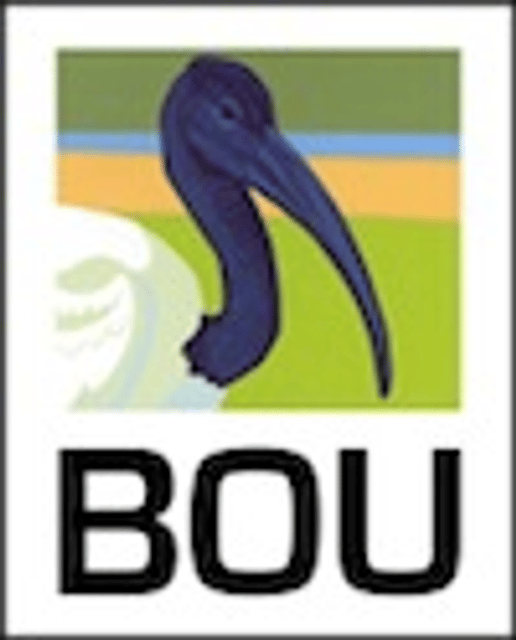British Ornithologists' Union

British Ornithologists' Union

| Abbreviation | BOU |
|---|---|
| Formation | 1858 (1858) |
| Purpose | Ornithological research |
President | Juliet Vickery RSPB |
Vice-president | Neil Bucknell |
Vice-president | Prof Tony Fox Aarhus University |
Secretary | Helen Baker Joint Nature Conservation Committee |
Key people | Alfred Newton (founder) |
Main organ | Council of Trustees |
| Website | www.bou.org.uk [14] |
The British Ornithologists' Union (BOU) aims to encourage the study of birds ("ornithology") and around the world, in order to understand their biology and to aid their conservation. The BOU was founded in 1858 by Professor Alfred Newton, Henry Baker Tristram and other scientists.[1] Its quarterly journal, Ibis, has been published continuously since 1859.
The Records Committee (BOURC) is a committee of the BOU established to maintain the British List, the official list of birds recorded in Great Britain.
BOU is headquartered in Peterborough and is a registered charity in England & Wales[2] and Scotland.[3]
| Abbreviation | BOU |
|---|---|
| Formation | 1858 (1858) |
| Purpose | Ornithological research |
President | Juliet Vickery RSPB |
Vice-president | Neil Bucknell |
Vice-president | Prof Tony Fox Aarhus University |
Secretary | Helen Baker Joint Nature Conservation Committee |
Key people | Alfred Newton (founder) |
Main organ | Council of Trustees |
| Website | www.bou.org.uk [14] |
Objectives and activities
Publishes Ibis as a leading international journal of ornithological science.
Organises a programme of meetings and conferences.
Awards grants and bursaries for ornithological research.
Encourages liaison between those actively engaged in ornithological research.
Provides a representative body of the scientific community able to provide ornithological information and advice to government and other policy makers.
Maintains and publishes the official list of birds recorded in Britain – The British List.
Records Committee
The British Ornithologists' Union Records Committee (BOURC) is the recognised national bird records committee for Britain. It maintains a list of birds of Britain. Its findings are published in Ibis, the house journal of its parent body the British Ornithologists' Union (BOU). From time to time, BOURC re-reviews records which it has previously accepted, to ensure they are acceptable in the light of improved knowledge of the species in question.
The Committee does not assess records of birds from Ireland; that task is carried out by the Irish Rare Birds Committee, which publishes its decisions in Irish Birds. For many years, records of IRBC-assessed rarities were included in the BOURC's reports, but this ceased in 2002, at the request of IRBC.[4]
BOURC is widely recognised as maintaining the most authoritative list of birds of Britain.[5]
BOURC has a chairman, a secretary and a number of voting members. It previously had a taxonomic subcommittee, set up to advise on taxonomic matters, but the disbanding of this subcommittee was announced on 6 November 2015; the BOU now contemplates relying entirely on one of the available global avian taxonomies with a view to adopting a single system for all its activities.[6]
Committee and taxonomic reports
The Committee publishes an annual report in Ibis (the BOU's international journal of avian science). All reports can be accessed via the British List pages of the BOU website [15] .
Previously, the Committee's Taxonomic Sub-committee also published regular reports, also in Ibis, and these too can be accessed via the British List pages of the BOU website [16] .
The Druridge Bay curlew
Following a detailed review by the British Birds Rarities Committee into the controversial identification of a curlew seen at Druridge Bay in Northumberland in 1998, which came to the conclusion that it was, as had been believed by many observers, a first-summer slender-billed curlew, this identification was accepted by BOURC, leading to the addition of this species to the British List.[7] [8]. A subsequent review of the record overturned the original decision Ibis 156 :236-242 [9].
Awards and lectures
The following are awarded:[10]
Godman-Salvin Medal
Union Medal (known as the "Janet Kear Union Medal" from 2019)[11]
Alfred Newton Lecture
List of presidents
1858-1867 : Henry Maurice Drummond-Hay (1814–1896)
1867-1896 : Lord Lilford (1833–1896)
1896-1913 : Frederick DuCane Godman (1834–1919)
1913-1918 : Robert George Wardlaw Ramsay (1852–1921)
1918-1921 : William Eagle Clarke (1853–1938)
1921-1922 : Henry John Elwes (1846–1922)
1923-1928 : Lord Walter Rothschild (1868–1937)
1928-1933 : William Lutley Sclater (1863–1944)
1933-1938 : Harry Witherby (1873–1943)
1938-1943 : Sir Norman Boyd Kinnear (1882–1957)
1943-1948 : Percy Roycroft Lowe (1870–1948)
1948-1955 : Sir Arthur Landsborough Thomson (1890–1977)
1955-1960 : William Homan Thorpe (1902–1986)
1960-1965 : Reginald Ernest Moreau (1897–1970)
1965-1970 : V C Wynne-Edwards (1906–1997)
1970-1975 : Guy Mountfort (1905–2003)
1975-1979 : Sir Hugh Elliott (1913–1989)
1979-1983 : Stanley Cramp (1913–1987)
1983-1987 : James F Monk (1915–2014)
1987-1990 : David Snow
1990-1994 : Janet Kear (1933–2004)
1994-1999 : John Croxall
1999-2003 : Ian Newton
2003-2007 : Christopher Perrins
2007-2011 : Alistair Dawson (Centre for Ecology & Hydrology)
2011-2015 : Jenny Gill (University of East Anglia)
2015-2019 : Keith Hamer (University of Leeds)
Honorary members
The following have been elected as honorary overseas members:[12]
Peter Berthold (Germany)
Jacques Blondel (France)
Paul F. Donald (UK)
Urs N. Glutz von Blotzheim (Switzerland)
Andrew Gosler (UK)
Soekarja Somadikarta (Indonesia)
Joe Sultana (Malta)
Staffan Ulfstrand (Sweden)
See also
IBIS
British Ornithologists' Union checklists
British Birds Rarities Committee